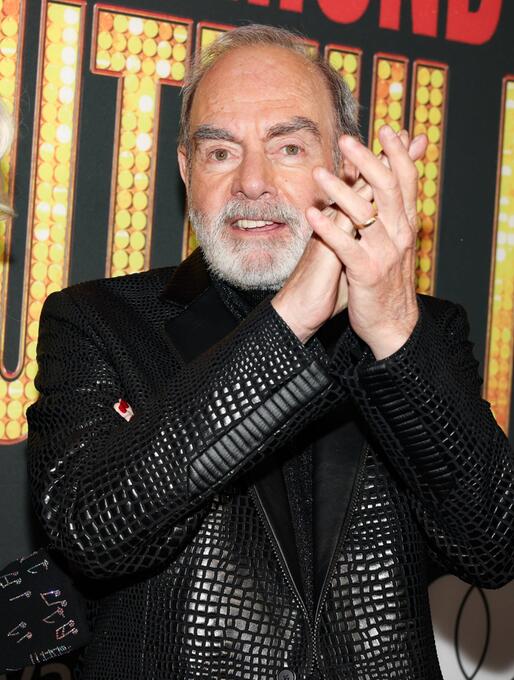
“I Am Your Caroline” — The Night Neil Diamond Met the Living Memory of His Greatest Song
The night was already electric. The lights dimmed, the chords began, and thousands of voices rose in unison: “Sweet Caroline… BAH BAH BAH…” But no one in the stadium could have predicted the moment that would silence even the loudest crowd of Neil Diamond’s career.
Midway through the song, as Neil — frail yet unbroken, sitting in his wheelchair — leaned into the chorus, a woman in the front row stood up. She was middle-aged, her hands trembling, her face streaked with tears. And in her hands, she held a sign that changed everything:
“I Am Your Caroline.”
The crowd fell still. Even the horns paused. Neil blinked, staring down at her, his voice catching in his throat. For a second, it seemed as if time had stopped.

The Story Behind the Sign
After the show, whispers spread like wildfire. Who was she? What did it mean? And why did Neil, the man who had sung “Sweet Caroline” to millions over half a century, suddenly go quiet?
The answer was heartbreak and poetry, all at once.
Decades ago, in the late 1960s, Neil Diamond had been walking the quiet streets of Boston, humming fragments of what would one day become “Sweet Caroline.” Struggling with the melody, he met a young man leaning against a lamppost, nervous and restless. They struck up a conversation. Neil, with his guitar case slung over his shoulder, asked what was on his mind.
The man confessed: he was about to become a father. He didn’t know what to name the baby if it was a girl. Neil, already rolling the name “Caroline” around in his head as part of his unfinished lyric, smiled and said softly: “Caroline. Trust me — it will sing.”
The man laughed, shook Neil’s hand, and promised to remember.
That baby was born a few months later. She was named Caroline. And on this night, more than fifty years later, she was standing just feet away from the man who had unknowingly given her both her name and her father’s proudest story.
Her father — the same man who had once met Neil on that fateful walk — had passed away only days before the concert. The sign she carried was not just a revelation. It was a farewell.
Neil’s Reaction
When Neil finally found his voice, he leaned toward the mic, his face trembling under the stage lights.

The band picked up again, slower this time, softer, as if even the horns and drums knew they were no longer playing for a crowd, but for one man’s memory.
The woman’s sobs turned into singing. The crowd joined her. And for the first time in decades, “Sweet Caroline” was not just an anthem. It was a prayer.
The Audience
Fans who had sung the song at weddings, at baseball games, at bar mitzvahs and stadiums, suddenly felt its words differently. They weren’t shouting. They were whispering, weeping, holding each other’s hands.
A man in the upper deck hugged his grown son. A group of college students who had never known the song’s origins clutched their phones but didn’t record — they just stood there, stunned, singing through tears.
Strangers embraced. Security guards wiped their eyes. The arena had become a cathedral.
Simon & Garfunkel Once Said…
Later, when asked about the moment, Paul Simon — himself a lifelong friend of Neil — said:
Art Garfunkel added:
The Legacy of “Sweet Caroline”
For years, Neil had admitted he never fully understood why “Sweet Caroline” resonated so deeply. He thought it was just catchy, maybe even “a little silly.” But as the crowd sang that night — thousands of voices carrying the words for a man who had just left this world — the meaning revealed itself.
It was never about the melody. It was about memory.
It was about fathers and daughters. About strangers and friends. About the quiet miracles of how one moment, one name, one song can ripple across generations and find its way home, half a century later, in a packed stadium.
The Final Chorus
By the final verse, Neil didn’t even sing. He simply sat in his chair, one hand on his chest, tears streaming down his face, as the crowd carried the song for him.
“Good times never seemed so good…” they sang, louder and louder, until the rafters shook.
The woman lowered her sign. She pressed a hand to her heart. For the first time in days, she smiled.
Neil raised his hand, pointing to her, and mouthed the words: “For your dad.”
The ovation lasted long after the lights dimmed. Not because of fame. Not because of spectacle. But because, for one night, “Sweet Caroline” became the story of a father, a daughter, and a promise that music — and love — will outlive us all.





